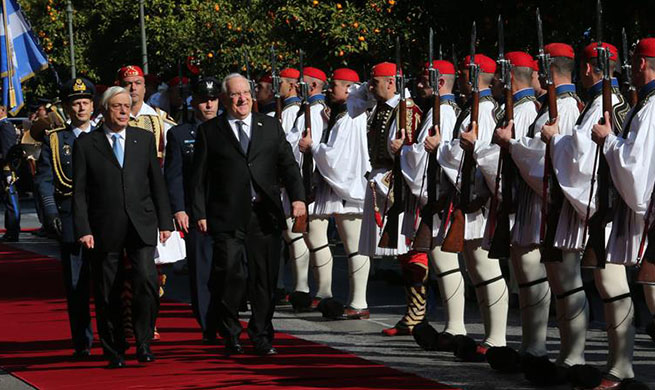LONDON, Jan. 29 (Xinhua) -- Brexit Secretary David Davis said Monday Britain wants a right to object to European Union laws passed during a transitional period when Britain no longer has a vote in Europe.
Davis gave evidence to a House of Lords Committee as the EU chief negotiator in Brussels, Michel Barnier, was spelling out Europe's terms after Britain quits the bloc in March 2019.
Davis also said existing international agreements, which include trade deals with other countries and agreements on aviation and nuclear power, should continue to apply during a transitional period.
In his evidence to the committee, Davis told politicians in Britain's unelected upper house that Britain wanted a right to object to new EU laws over which the UK had no say and disagreed with.
He said: "We will start talking about that next week. We will face an objection against it, I'm sure. We take the view that it is not particularly good democratic practice to have your country accept without any say-so anything, and particularly if the EU takes it upon itself to do something which is actively disadvantageous to a major British industry, or something like that."
Davis said he wanted such a safeguard to be included in the withdrawal agreement between Britain and the EU.
Davis also rejected claims that Britain was interested in getting a three-year transition rather than a two-year period, saying weekend media reports about a possible there-year transition were bogus stories.
He told the committee: "Twenty one months may be fine, plus or minus a few months is neither here nor there. But we are not talking about extending to three years. It isn't necessary."
Commenting on the publication of the EU Council's negotiating directives for the transition period of Brexit, Trades Union Congress General Secretary Frances O'Grady said: "The transition period must fully protect workers' rights. Theresa May promised to protect workers' rights, and the EU council guidelines are clear on this too.
"We hope the UK and the EU can quickly reach an agreement that retains a level playing field on workers' rights. And it must make sure UK workers benefit from any new rights that the EU introduces during the transition period."
In an update to MPs Monday in the House of Commons Brexit Minister Robin Walker said during an implementation period Britain will still make our voice heard.
He said: "We will have to agree on a way of resolving concerns if laws are deemed to run contrary to our interests, and if we have not had our say. We will agree on an appropriate process for this temporary period so that we have the means to remedy any issues through dialogue as soon as possible. All that will be provided for in the withdrawal agreement that we reach with the EU, which will have the status of a new international treaty."
















